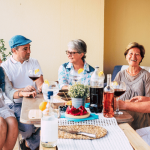Social capital is as necessary to a fruitful life as is monetary means. Familial ties, trusted friendships and participation in the greater community are examples of the social wealth that keeps individuals, especially seniors, from descending into depression and dementia.
Seniors are more vulnerable to losing touch with their social lives, since spouses pass on, careers are no longer a central aspect of their lives and family members relocate. Older peoples’ social connections gradually diminish as a commonly accepted part of aging.
 Researchers in recent years have explored the benefits of social activity in the elder population and concluded that social fulfillment is a vital component to staying healthy. Bryan James, an epidemiologist at Rush Alzheimer’s Disease Center, uncovered the relationship between cognitive health and social interaction. People who socialized frequently, he found, experienced a startling 70 percent less decline in cognitive abilities than those who experienced low levels of socialization.
Researchers in recent years have explored the benefits of social activity in the elder population and concluded that social fulfillment is a vital component to staying healthy. Bryan James, an epidemiologist at Rush Alzheimer’s Disease Center, uncovered the relationship between cognitive health and social interaction. People who socialized frequently, he found, experienced a startling 70 percent less decline in cognitive abilities than those who experienced low levels of socialization.
James also pinpointed the correlation between lower levels of disability and higher levels of socialization. Seniors who often participate in social events have a 43 percent lesser rate of disability than those who infrequently connect with others.
Being socially connected with family, friends and neighbors offers increased emotional well-being in the lives of senior citizens. Depression and moodiness are often warded off when older folks make efforts to be around other people. Elderly individuals’ minds simply become more alert and engaged when they interact with others. Constant mental stimulation helps deter dementia-related impairments, like Alzheimer’s disease.
Plus, the physical and cognitive health benefits of staying socially active is strongly correlated with a senior’s life expectancy. The richness of a senior’s social schedule adds years to the individual’s life. Individuals who rarely include socialization in their agenda are subject to loneliness and its negative health repercussions, like heart disease, depression and dementia.
Senior citizens have abundant opportunities to remain socially active:
Religious Organizations
Local churches, synagogues and temples offer an assortment of communal activities in which older people can participate. The musically inclined may wish to sing in the choir or play a musical instrument during services. Religious organizations also offer relaxing retreats. Weekly worship services are an optimal way to stay involved of the happenings in the community. Churches may also have a need for volunteers to help out during social functions.
Volunteering
Seniors who sing may also include in their schedule, singing in a nursing home choir on a volunteer basis. The opportunity to entertain other elderly individuals offers emotional reward to the generous senior. Fellow choir members are also more likely to share similar musical interests, which is likely to lead to the development of meaningful friendships.
Hospitals, food pantries and soup kitchens are additional places where older volunteers can spend time helping those in need—and staying in touch with the local community.
Family
 Older individuals whose families are nearby have a welcome opportunity to participate in family events. Grandchildren may need babysitting or help with school activities; or other aging family members may need an extra hand at home. Scheduling time with the family a few times a month or even weekly has innumerable social benefits for the senior citizen.
Older individuals whose families are nearby have a welcome opportunity to participate in family events. Grandchildren may need babysitting or help with school activities; or other aging family members may need an extra hand at home. Scheduling time with the family a few times a month or even weekly has innumerable social benefits for the senior citizen.
Part-time Work
Seniors who choose to include a part-time job into their lives experience a sense of purpose and well-being, not to mention the social outlets working offers. In addition to the emotional benefits of working part time, the retired individual earns supplemental income, a practical advantage.
Elderly individuals who seek out less physically demanding work can turn to jobs in libraries, accounting or tax offices or retail establishments.
Local Clubs
Many seniors join a club to spend their days with like-minded individuals. Hobbies can direct seniors to the most appropriate club. Quilting or sewing clubs are ideal for those who enjoy creating crafts from scratch. Musician clubs offer a social outlet for those who share musical interests. For physically hardy seniors, hiking clubs or tennis clubs offer plenty of physical as well as social activity.
Experts even recommend seniors start their own club when one is not nearby. A cooking club offers a chance for food lovers to gather and dabble in concoctions cooked up in one afternoon. Seniors who start a wine tasting club bring in sophisticated older individuals who offer a wealth of their own expertise and recommendations for wine.
Fitness Centers
Physical activity helps aging individuals get out and mingle with active people. Seniors who are more comfortable with joining a senior recreation center than a traditional gym will find similarly aged individuals working out, taking yoga classes or swimming laps in the pool. Social bonds can be developed on the tennis court, in the pool or while chatting on a treadmill.
Caregivers
 Even seniors whose cognitive and physical decline is severe benefit from socialization. Those individuals who are bound to their home for most of the day can experience pleasant interactions with caring supporters, such as in-home caregivers. Professional caregivers can be hired to provide basic care but also to nurture relationships with their senior care recipients. Oftentimes, seniors who are home bound look forward to the hours when their caregivers arrive, as meaningful relationships have blossomed.
Even seniors whose cognitive and physical decline is severe benefit from socialization. Those individuals who are bound to their home for most of the day can experience pleasant interactions with caring supporters, such as in-home caregivers. Professional caregivers can be hired to provide basic care but also to nurture relationships with their senior care recipients. Oftentimes, seniors who are home bound look forward to the hours when their caregivers arrive, as meaningful relationships have blossomed.
Families with aging parents can turn to trusted in-home elder care services for the immeasurable benefits a caregiver brings to seniors’ lives. Caregivers from reputable agencies, such as Assisting Hands Home Care, are available to provide basic, non-medical support services to seniors in the comfort of home. Professional caregivers also provide transportation to their care recipients’ doctors’ appointments, exercise classes, the grocery store and social appointments.
The compassionate caregivers at Assisting Hands Home Care also place high importance on senior companionship to prevent the social isolation commonly seen in older individuals. Caregivers play board games and do puzzles with seniors to keep their minds alert. Relationships are also formed through pleasant conversations.
Assisting Hands Home Care is dedicated to serving the needs of the elderly in the local community. Our team discusses the care recipients needs in order to develop a customized care plan, one that allows the senior to live with dignity and independence.




